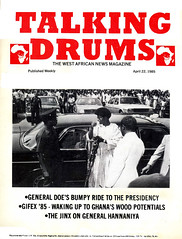Problems confronting minorities in American education (Part 2)
Dorothy V. Smith
From time immemorial, students from Africa and other parts of the so-called Third World have made it a sacrificial point of leaving their respective countries for the United State. and other advanced nations in search of the proverbial golden fleece. Some of these students, as minorities in host countries, often face insurmountable problems. Unfortunately, however, most of the problems are not known to these ambitious students before they embark on their sojourn abroad. In this article, Professor Dorothy V. Smith of the History Department of Dillard University in New Orleans, Louisiana, USA, spells out some of the numerous problems which often confront minority students, including Africans, in American higher education. This piece concludes the article the first part of which was published on April 1.Unfortunately, a common tactic among some biased and unscrupulous professors is for them to divide minority students by deliberately identifying a favourite non-traditional student as a model student. Such a particular minority student usually comes from a white undergraduate school and has, therefore, been taught to react in a prescribed manner. (This reaction often does not involve thinking).
In the mind of the white professor, his chosen model student presents no threat to either the other students or the professors themselves. Minority students are, as a consequence, encouraged to become involved in vicious broils of trying to compete with the selected model student for worthless pseudo-recognition. In the end, the struggle does two things: one, it encourages minority students to engage in a useless cause and, secondly, it implants the idea they can never be among the top-flight scholars.
In the final analysis, if non-traditional students are able to survive this form of academic onslaught, the social scene is equally harsh. In all, minority women are perhaps the greatest victims of these repressive situations, especially so if they are single. Unfortunately, too, the opportunities for such female students to have a normal campus life for recognition as being sensitive persons who can enjoy good conversation, dinner, sports, and theatre are almost non-existence.
As expected, professors have a tremendous influence on the direction of the research and the writing stages of a student's graduate studies program. Consequently, they steer it in a direction in which they are most comfortable, which may often not be the direction of interest to the minority student.
It is also an undeniable fact that the proportion of Black males to females on campuses is often extremely lop- sided. This problem is often compounded by the fact that minority males are sought by women in general, a situation which greatly diminishes the possibility of a date for the non- traditional women. Also, minority women invariably seem to be much more sexually exploited by their professors for the sake of grades, recommendations and the like, than their male counterparts. On the other side of the coin, minority male students too face serious problems, because they present a greater perceived threat to the White power structure than do the females. As a result, they too are soon weeded out of their academic programs on very flimsy excuses.
For those who have been able to endure, they certainly have to show their true love and dedication to the completion of their degree programs. On most occasions, such students are genuinely interested in exploring and expanding the established arena of knowledge as well as challenging and correcting existing traditional misconceptions. Yet, since there is no encouragement from professors and administrators, the issue is how this can be done. Very often, minority students are coerced into writing on topics and also to carry out research on established but unpopular topics merely to complete the degree.
As expected, professors have a tremendous influence on the direction of the research and the writing stages of a student's graduate studies program. Consequently, they steer it in a direction in which they are most comfortable, which may often not be the direction of interest to the minority student.
Furthermore, it is possible for professors to become lazy and too involved in their personal research programs, yet they feel threatened academically to release students to work on topics with others who have much more expertise. Such unfortunate situations still exist even if professors themselves will admit that they have limited and shallow knowledge about the particular subject matter. Indeed, they intimidate students to re-interpret and, sometimes, to revise some traditional issues because that is the parochial direction they see to be fruitful as supervisors. This is often an honest mistake on the part of the professors, although this obviously does not necessarily help either the minority student in particular or the academic community in general.
Generally, the selection of a topic may be the single most important decision-making issue of a graduate student's career. However, minority students may particularly be faced with the issue of relevance, and the queries are many: what issues need to be explored in the Black experience, and what is the most effective means of dealing with the problem? Does the racist exclusion of minority history, culture, and experiences from mainstream scholarship demand a crusade and, above all, will these non- traditional students lead it? These questions have to be given serious thought in terms of conviction and resources.
The future does not look very promising for numerous minority students. Could there be an academic conspiracy? For the common approach, as well as a prevalence of white advisors and resources, the scarcity of Black ones often tend to obscure numerous pertinent developments. Therefore, questions, subsequently, remain largely unexplored to deal with the behaviour and communities of minority students. These inimical practices are to be stopped if education is really to be the great American adventure, the largest public enterprise and, above all, the country's most important business.
